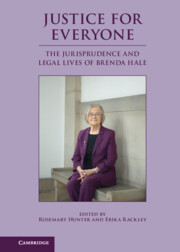Book contents
- Justice for Everyone
- Justice for Everyone
- Copyright page
- Contents
- Figures
- Tables
- Contributors
- Acknowledgements
- Table of Cases
- Table of Legislation
- Table of International Treaties and Conventions
- Brenda Hale Bibliography
- Part I Introduction
- Part II Personal Reflections
- Part III Academic
- Part IV Law Commissioner
- Part V Judge
- Judicial Leadership
- 11 Brenda Hale
- 12 Assessing Lady Hale’s Impact on the UK’s Final Appeal Courts
- 13 The Qualities of Lady Hale’s Legal Reasoning
- 14 On Personhood for Everyone
- 15 Lady Hale and Access to Justice
- 16 Lady Hale in the South African Courts
- Family Law and Children’s Rights
- Human Rights and the State
- Private Law and the Individual
- Part VI Creative Encounters
- Index
12 - Assessing Lady Hale’s Impact on the UK’s Final Appeal Courts
from Judicial Leadership
Published online by Cambridge University Press: 05 May 2022
- Justice for Everyone
- Justice for Everyone
- Copyright page
- Contents
- Figures
- Tables
- Contributors
- Acknowledgements
- Table of Cases
- Table of Legislation
- Table of International Treaties and Conventions
- Brenda Hale Bibliography
- Part I Introduction
- Part II Personal Reflections
- Part III Academic
- Part IV Law Commissioner
- Part V Judge
- Judicial Leadership
- 11 Brenda Hale
- 12 Assessing Lady Hale’s Impact on the UK’s Final Appeal Courts
- 13 The Qualities of Lady Hale’s Legal Reasoning
- 14 On Personhood for Everyone
- 15 Lady Hale and Access to Justice
- 16 Lady Hale in the South African Courts
- Family Law and Children’s Rights
- Human Rights and the State
- Private Law and the Individual
- Part VI Creative Encounters
- Index
Summary
Brenda Marjorie Hale, Baroness Hale of Richmond, began her illustrious career in the UK’s top court in R v. HM Coroner for the Western District of Somerset ex parte Middleton with Lord Bingham (one of her heroes) in the chair. It was classic Lady Hale territory, whether the then provisions for inquests into a death in England and Wales complied with article 2 of the European Convention on Human Rights (ECHR). We do not know what Lady Hale contributed to the judgment since, unusually, the decision was handed down as an opinion of the whole Appellate Committee. However, we know that she had a clear view of the case and that she expressed it without the hesitation that could afflict newcomers to the House. This emerges from Lord Bingham’s judicial notebook in the case, which reveals that, in the post-hearing conference, Lady Hale was the second to speak, that she reached the same result as Lord Carswell (who spoke first) but for different reasons, and that her clear-sighted analysis of the Human Rights Act 1998 (HRA) determined her conclusion rather than Strasbourg case law. Principle before precedent is a Lady Hale hallmark. Lady Hale’s last case in which she sat before her retirement from the Supreme Court was Whittingdon Hospital NHS Trust v. XX, and in it she presided and wrote the lead judgment. It was even more quintessential Lady Hale territory.
- Type
- Chapter
- Information
- Justice for EveryoneThe Jurisprudence and Legal Lives of Brenda Hale, pp. 117 - 133Publisher: Cambridge University PressPrint publication year: 2022

